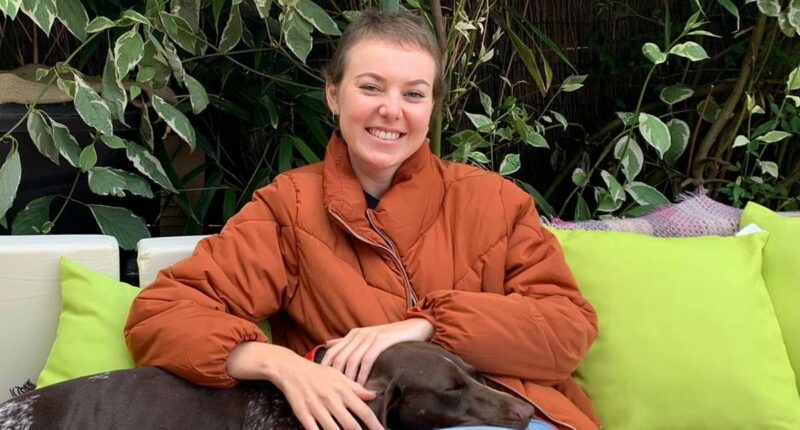Share this @internewscast.com
Abi Smith, a 30-year-old from Stirchley in the West Midlands, first noticed something was amiss with her vision during a flight to the United States. Assuming it was merely a reaction to the shift in air pressure, she didn’t realize this was an early sign of something far more serious—a brain tumor.
While on her 2019 holiday, Abi’s symptoms began to worsen. Alongside the unsettling double vision, she experienced a loss of mobility in both legs and found herself struggling with her grip.
Concerned about her inability to hold kitchen utensils, Abi sought medical attention. Despite her worries, a CT scan at a local hospital failed to reveal any issues.
Back in the UK, Abi turned to Queen’s Hospital in Burton upon Trent for further investigation. An MRI scan there finally uncovered the root cause of her distressing symptoms.
Initially, doctors suspected a stroke due to her inability to move the right side of her body, including an eye that had noticeably turned inward. However, the MRI results signaled otherwise, confirming the presence of a brain tumor.
Initially, she said the doctors thought she’d had a stroke because she couldn’t move the right side of her body, including her eye, which had turned inwards.
But the scan results revealed a glioma, a cancerous type of brain tumour, at the base of her brain which had spread along to the top of her spine.
‘When I was given my diagnosis, I was on my own, and although I was terrified, I felt a sense of relief that the medical team had a plan,’ she said.
![Abi Smith [pictured] has told of how she put her double vision down to air pressure on a plane before finding out it was a sign of a deadly brain tumour](https://i.dailymail.co.uk/1s/2025/11/25/10/104167891-15324151-image-a-1_1764068289957.jpg)
Abi Smith [pictured] has told of how she put her double vision down to air pressure on a plane before finding out it was a sign of a deadly brain tumour

Sadly, she was told that due to the location of the tumour the main part of it couldn’t be removed surgically

It is also important to know the tell-tale signs of a brain tumour to help catch in its early stages
Symptoms of gliomas can include double vision and one-sided weakness or numbness as well as headaches, seizures, nausea and vomiting, cognitive or personality changes.
The prognosis depends on the grade of the tumour, with the highest being grade four which includes glioblastomas.
Sadly, in Ms Smith’s case, because of its location, the tumour itself was deemed inoperable, but surgeons were able to remove the spinal component in July 2019.
Following the surgery she underwent a course of radiotherapy, followed by six gruelling months of chemotherapy.
‘Treatment was harsh, and I lost my hair,’ she said. ‘It was a small price to pay for the amazing treatment that managed to considerably shrink my tumour.’
Now she still has routine scans, attends fundraising events to raise awareness and this Christmas is supporting the Brain Tumour Research Christmas Appeal.
‘More funding is urgently needed to understand, treat and ultimately cure brain tumours,’ she said.
‘This Christmas, I’m encouraging people to support the appeal. Every pound donated helps fund the breakthroughs we desperately need.’

Now she still goes for routine scans and attends fundraiser events for the charity Brain Tumour Research

She recently hosted a wellness day which raised hundreds of pounds for the charity

Now she is encouraging others to donate to the charity so they can make breakthroughs which she said are desperately needed

She also runs a greetings card business called The Cancer Card and every sale helps support the charity
She also supports them through every sale of her greetings card business called The Cancer Card and recently hosted a wellness day raising hundreds of pounds.
Letty Greenfield, community fundraising manager at the charity said: ‘Abi’s strength and positivity in the face of such a challenging diagnosis are nothing short of inspiring.
‘We’re so grateful for Abi’s ongoing support and her dedication to turning such a difficult experience into a force for good.
‘We hope Abi’s story inspires others to support our Christmas appeal.’
It comes amid a worrying rise in brain tumours in the UK since the early 2000s, with them increasing by over a quarter.
And concerningly over the past decade, figures show cases of the devastating illness have risen by around a tenth.
Latest figures estimate there are around 13,000 new brain or other central nervous system and intracranial tumour cases in the nation each year.
There are around 5,500 deaths caused by the illness every year which is equivalent to 15 every day.
This makes them the 10th most common cause of cancer death in the UK, and experts predict it could rise to 6,600 deaths per year by 2040.












